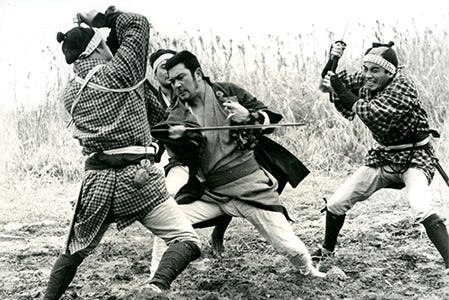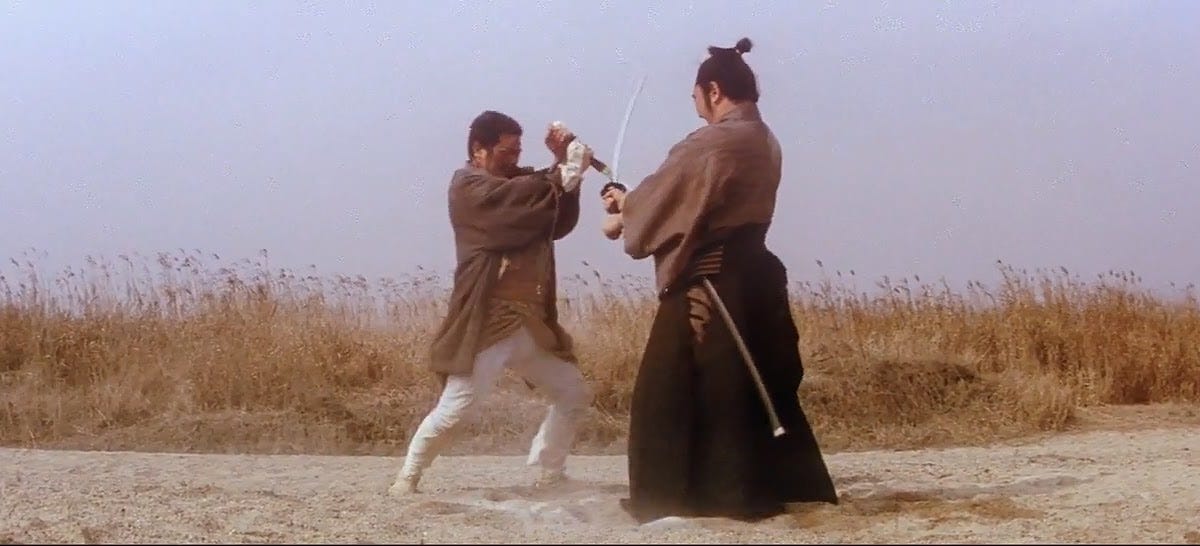Runtime is a series where Oliver Little tackles long film series. Here is the first part of that series, where he makes his way through the Zatoichi franchise, a classic cadre of chanbara films.
Zatoichi: The Blind Swordsman, 6/26
Zatoichi and the Chest of Gold (1964)
Runtime Watched: 515 minutes
I first watched this film almost two months ago. I thought I’d be able to put it on, take a few notes, and write a quick review of it before I had to head to work in the afternoon. Instead, there was a lot of pausing, jotting notes down, rewinding, and watching in awe. It was clear to me, after taking about 10 minutes to get through the intro sequence, that I had started on a fool’s errand. Fast forward a few months and I finally had the opportunity to write that review. After looking over my notes I decided that a rewatch before writing the review was in order. Boy, am I glad I rewatched it.
This film is even more rewarding on the rewatch. I didn’t expect to come so close to the perfect Zatoichi film with only six entries into the franchise, but here we are. Let’s dive in.
I’m going to try my best to keep it brief regarding the intro sequence, but oh man is it crazy. I try to avoid play-by-plays and exposition dumps in my reviews, but I’m going to do exactly that for the intro.
Sixty five seconds into the runtime and Ichi mows down three men. They’re triangulated around him while he stands in the middle, coolly playing his little flute. They all lurch forward at once and within moments they all fall to the ground. Ichi’s sword is sheathed just as quickly as it's drawn and before the dust has settled, he’s back to whistling his flute.
The camera pans to the right and we see Ichi kneeling on the ground. It zooms out to reveal six men surrounding him. He dispatches them with fluidity and ease. We’re ninety eight seconds in and he’s seamlessly killed nine men.
The camera tracks further right before tilting down to reveal six more men. It zooms out once more and Ichi is standing at the ready. These men are slightly more apprehensive to die, and the fight is slightly more drawn out. Nonetheless, by the one hundred eighty second mark, these men, too, are dead.
At a rate of 5 kills per minute, the opening credits promise a violent feature to follow.
As far as I can tell, this is a singular sequence among the previous films. The credits usually follow a typical routine; different shots of nature play while Ichi wanders around. In Zatoichi and the Chest of Gold the intro sequence takes on a surreal quality, both because of the creepy/mystic music that plays and the way it’s shot. The intro plays out almost like your average bond intro sequence except it takes place entirely in a black box theater. Other than Ichi’s lightning fast swordplay and admittedly superhuman perception the Zatoichi franchise is extremely grounded. The environment, music, and camera movement all comes together to create something dreamlike and foreboding.
In hindsight, that fast-paced and erratic, but controlled, camera movement foreshadows the unique and fantastic cinematography that makes this entry stand out.
Now, onto the meat of the matter.
The actual film opens with Ichi riding a horse into the village of Itakura, accompanied by a young woman, Ochio, from the town. He’s there to pay respects at the grave of a man named Kichizo, who he killed two years prior. Later, we’ll find out Ochio is Kichizo’s sister. It’s clear that she holds some major resentment towards Ichi but she’s playing it cool for the time being.
Ichi gets sucked into a celebration with a bunch of the villagers. They’re enthused over having paid a massive tax to the local magistrate after a few underwhelming harvests. Cut to the money in transit: a gang of bandits attack the caravan of officials who are transporting the money.
The fight scene is filmed incredibly well. The cinematographer, Kazuo Miyagawa (who had previously worked on such all-time classics as Rashomon and Yojimbo), is in full force. The film has hardly started and he’s already masterfully employed an array of camera techniques, such as whip pans, double exposure, and tracking shots. We’ll continue to see brilliant use of these techniques and more through the reminder of the film.
Back to the plot for a moment.
They steal the money. An onlooker goes back to Itakura and tells them that they saw Ichi in the area of the robbery, so the villagers put the blame on him. He promises to find out who did it and return the money so as to clear his name.
Sorry for another exposition dump, but at least you’re now caught up on the inciting incident and can see where we’re headed from here. If you’ve been keeping up with the Runtime series, you may notice that this incident slightly breaks the trend of the Ichi franchise. Typically, Ichi stumbles upon someone in need of help, whether it be some villagers who are in a bind or a damsel in distress seeking assistance and promises to help them out of the kindness of his heart. Here, he’s more or less thrust into proving his innocence after being accused of a terrible act.
This kind of pissed me off. Rather the treatment of Ichi by the villagers pissed me off. They toss him around, beat him, and go as far as breaking a bottle over his head. The whole time I was yelling at the screen for Ichi to bust his sword out and teach those rascals a lesson. Of course, Ichi plays meek and promises to help them rather than get annoyed at the baseless accusation. It plays into his character, but feels a little hamfisted.
The meek and seemingly innocent Ichi we know is contrasted by an arguably creepy and pervy Ichi we see a couple times in this film. Two moments in particular stand out.
The first involves Ichi using what I can only presume was the women’s section of a public bath house, revealing himself only after the lady strips naked and enters the pool. He makes a few jokes about how she doesn’t have to be embarrassed because he’s blind, but he also makes comments about her having a nice body and tells her she doesn’t need to cover up after she covers up, making me think he isn’t as blind as we think? I know he’s blind but, I don’t know, this is just strange. It’s clear to me that this was played for laughs and that the humor doesn’t translate very well in the current age.
The other scene takes place while he’s soliciting a maid for sex. Maybe that isn’t exactly right, but he’s laying his charm on thick. In particular, he keeps telling her how he knows she is beautiful because she smells so nice. They bang off screen and he tries to slip away when she requests money. After he realizes she’s a sex worker he pays her and makes a comment about how she needs to bathe. The implication being that he was hamming up how nice she smelled to try and charm her, when really he was lying the whole time. A little skeevy, definitely played for laughs, didn’t really work for me.
I’m gonna wrap this review up by talking about the two other amazing fight scenes. I’ve been waiting for the whole franchise for some action and crazy fights, and Zatoichi and the Chest of Gold absolutely delivers.
There’s a scene where Ichi is carrying a young boy on his back, through a forest, down the side of a mountain.
He’s returning from the hideout of a local hero who has been cast into hiding by the magistrate. The boy points out that a massive brigade of the magistrates' soldiers are climbing up the mountain road. Ichi, being the man he is, distracts the soldiers by calling attention to himself. He then proceeds to mow down a bunch of soldiers while carrying the boy and navigating through the difficult terrain. Badass.
Then, there’s the final fight. The big bad, Juchiro, a ronin (played by Tomisaburô Wakayama, who would go on to play the lead in the also incredibly long series of films, Lone Wolf and Cub) hired by the magistrate to steal the villagers tax payment at the beginning, challenges Ichi to a duel. The duel starts with Juchiro pretty much ambushing Ichi on horseback. He uses a whip to tangle Ichi and drags him around. By the time Ichi is able to throw Juchiro off the horse, he’s pretty beat up. But that’s never stopped Ichi before. Fifteen seconds later, Juchiro is dead. Magnificent.
This is an amazing entry in the franchise. I can’t wait to see what the next one has in store. I promise I won’t take as long of a break between reviews, so stay tuned!








